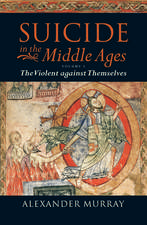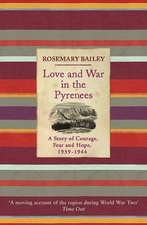Rites and Passages – The Beginnings of Modern Jewish Culture in France, 1650–1860: Jewish Culture and Contexts
Autor Jay R. Berkovitzen Limba Engleză Paperback – 21 iul 2007
Din seria Jewish Culture and Contexts
-
 Preț: 448.21 lei
Preț: 448.21 lei -
 Preț: 198.22 lei
Preț: 198.22 lei -
 Preț: 285.64 lei
Preț: 285.64 lei -
 Preț: 192.05 lei
Preț: 192.05 lei -
 Preț: 433.78 lei
Preț: 433.78 lei -
 Preț: 237.53 lei
Preț: 237.53 lei - 11%
 Preț: 480.95 lei
Preț: 480.95 lei -
 Preț: 288.94 lei
Preț: 288.94 lei -
 Preț: 295.23 lei
Preț: 295.23 lei -
 Preț: 232.70 lei
Preț: 232.70 lei - 11%
 Preț: 449.87 lei
Preț: 449.87 lei -
 Preț: 337.06 lei
Preț: 337.06 lei - 23%
 Preț: 570.97 lei
Preț: 570.97 lei -
 Preț: 469.00 lei
Preț: 469.00 lei -
 Preț: 372.81 lei
Preț: 372.81 lei -
 Preț: 245.25 lei
Preț: 245.25 lei - 11%
 Preț: 570.69 lei
Preț: 570.69 lei - 11%
 Preț: 478.37 lei
Preț: 478.37 lei -
 Preț: 245.25 lei
Preț: 245.25 lei - 11%
 Preț: 440.19 lei
Preț: 440.19 lei -
 Preț: 467.05 lei
Preț: 467.05 lei - 11%
 Preț: 509.01 lei
Preț: 509.01 lei - 11%
 Preț: 443.59 lei
Preț: 443.59 lei - 11%
 Preț: 445.33 lei
Preț: 445.33 lei -
 Preț: 516.53 lei
Preț: 516.53 lei -
 Preț: 406.30 lei
Preț: 406.30 lei - 11%
 Preț: 503.73 lei
Preț: 503.73 lei - 11%
 Preț: 535.02 lei
Preț: 535.02 lei - 11%
 Preț: 470.68 lei
Preț: 470.68 lei - 11%
 Preț: 447.03 lei
Preț: 447.03 lei - 11%
 Preț: 477.51 lei
Preț: 477.51 lei - 11%
 Preț: 506.29 lei
Preț: 506.29 lei - 11%
 Preț: 502.86 lei
Preț: 502.86 lei -
 Preț: 435.69 lei
Preț: 435.69 lei -
 Preț: 436.67 lei
Preț: 436.67 lei - 11%
 Preț: 448.73 lei
Preț: 448.73 lei - 11%
 Preț: 444.13 lei
Preț: 444.13 lei -
 Preț: 417.84 lei
Preț: 417.84 lei - 11%
 Preț: 440.19 lei
Preț: 440.19 lei - 11%
 Preț: 505.43 lei
Preț: 505.43 lei - 11%
 Preț: 507.99 lei
Preț: 507.99 lei -
 Preț: 438.95 lei
Preț: 438.95 lei - 11%
 Preț: 469.80 lei
Preț: 469.80 lei - 11%
 Preț: 506.29 lei
Preț: 506.29 lei - 11%
 Preț: 447.90 lei
Preț: 447.90 lei - 11%
 Preț: 441.30 lei
Preț: 441.30 lei - 11%
 Preț: 473.52 lei
Preț: 473.52 lei - 11%
 Preț: 501.97 lei
Preț: 501.97 lei -
 Preț: 339.71 lei
Preț: 339.71 lei
Preț: 244.38 lei
Nou
Puncte Express: 367
Preț estimativ în valută:
46.76€ • 48.95$ • 38.92£
46.76€ • 48.95$ • 38.92£
Carte disponibilă
Livrare economică 10-24 martie
Preluare comenzi: 021 569.72.76
Specificații
ISBN-13: 9780812220087
ISBN-10: 0812220080
Pagini: 344
Dimensiuni: 163 x 233 x 19 mm
Greutate: 0.48 kg
Editura: MT – University of Pennsylvania Press
Seria Jewish Culture and Contexts
Locul publicării:United States
ISBN-10: 0812220080
Pagini: 344
Dimensiuni: 163 x 233 x 19 mm
Greutate: 0.48 kg
Editura: MT – University of Pennsylvania Press
Seria Jewish Culture and Contexts
Locul publicării:United States
Notă biografică
Cuprins
Introduction
PART I. LEADERSHIP, COMMUNITY, AND RITUAL IN THE ANCIEN RÉGIME
1. Communal Authority and Leadership
2. Secularization, Consumption, and Communal Controls
3. Ritual and Religious Culture in Alsace-Lorraine
PART II. REVOLUTION, RÉGÉNÉRATION, AND EMANCIPATION
4. The Ordeal of Citizenship, 1782-1799
5. Religion, State, and Community: The Impact of Napoleonic Reform
6. The "Jewish Question" During the Bourbon Restoration
PART III. TRANSFORMATIONS IN JEWISH SELF-UNDERSTANDING
7. Scholarship and Identity: La Science de Judaïsme
8. Rabbinic Authority and Ritual Reform
9. Patrie et Religion: The Social and Religious Implications of Civic Equality
Conclusion
Abbreviations
Notes
Bibliography
Index
Acknowledgments














